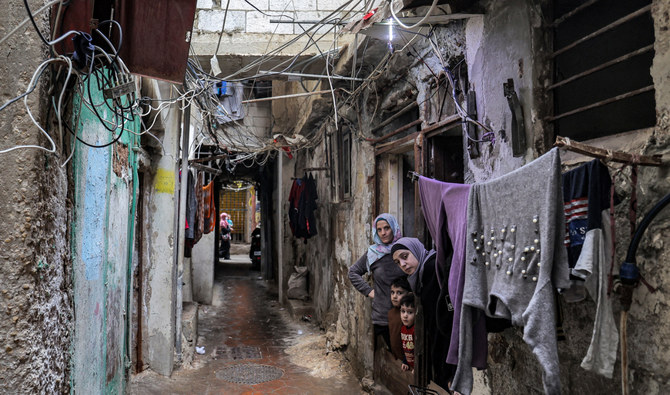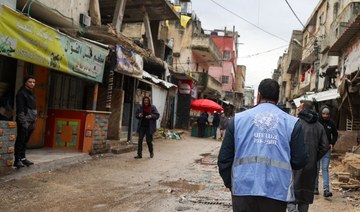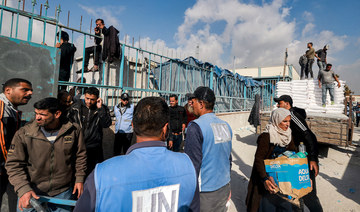LONDON: With the primary lifeline for millions of Palestinian refugees in the Middle East likely to be severed by the end of February, many families reliant on the UN Relief and Works Agency fear they could fall deeper into poverty — or worse.
Since fleeing the Yarmouk camp in Damascus and moving to Lebanon in 2015, Ayham, whose name has been changed to protect his identity, and his family of three have been surviving on the modest allowance provided by UNRWA.
“We are barely making ends meet even though I do some laboring whenever I find it,” Ayham, 43, told Arab News. “How are we going to survive if we lose UNRWA’s monthly stipend and how will my daughter receive any education?”
Ayham’s family were among the 31,400 Palestinian refugees who fled to Lebanon from neighboring Syria after protests against the government of President Bashar Assad in 2011 escalated into a full-blown civil war.

Shatha, the daughter of 48-year-old Palestinian refugee Issa Al-Loubani, looks out the window of their apartment in the Palestinian Yarmuk camp, on the southern outskirts of the Syrian capital Damascus, on November 25, 2020. (AFP/File)
UNRWA has been providing Palestinian refugees in Gaza, the West Bank, Syria, Lebanon, and Jordan with a monthly cash grant of $100 per family, and an additional $27 for each family member.
For those who have been unable to secure a steady income, the stipend has been all that has stood in the way of destitution. However, on Jan. 26, the US suspended its funding for UNRWA in response to troubling allegations. Several other major donors quickly followed suit.
Consequently, the UN agency, founded in 1949 in the wake of the mass exodus of Palestinians during the Nakba, will likely have to halt operations, including in the embattled Gaza Strip, by the end of the month if funding is not restored.
The funding suspensions came after Israeli intelligence alleged that 12 UNRWA employees were involved in the Hamas attack of Oct. 7, and that 10 percent of the agency’s 12,000 employees in Gaza had doubled as Hamas or Islamic Jihad operatives.
On Oct. 7, Hamas carried out a surprise attack on southern Israel, killing 1,200 people and taking 240 others captive.
In retaliation, Israel launched a bombing campaign in Gaza, killing more than 27,000 people, according to the Gaza Health Ministry, wounding 66,000 others, and forcibly displacing 85 percent of the enclave’s 2.2 million population.

Palestinian refugees gather outside the offices of the UN agency for Palestinian refugees, UNRWA, in Beirut on January 30, 2024 to protest against some countries' decision to stop funding the organization. (AFP)
Munir Nuseibah, professor of international law at Al-Quds University in Jerusalem, said cutting UNRWA funds was “unjustifiable.”
He told Arab News: “Defunding UNRWA at a time during which the Palestinian population is suffering from Israel’s genocidal war and policies, including starvation, reflects complicity with this crime.
“Just when the International Court of Justice ordered allowing humanitarian services and aid access to Gaza’s civilians, Israel’s allies decided to defund UNRWA.”
After South Africa brought a case to the ICJ accusing Israel of committing genocide in Gaza, the UN’s highest court ordered Israel to take all measures within its power to prevent genocidal acts and to allow humanitarian aid into the Palestinian enclave.
Some analysts have even accused donor nations of hypocrisy, highlighting occasions when UN agencies have been caught up in scandals yet have not lost their funding.
INNUMBERS
PALESTINIAN REFUGEES
- 1.5m In Jordan, Lebanon, Syria, Gaza, and the West Bank.
- 489,292 Hosted by Lebanon.
- 438,000 Hosted by Syria.
- 31,400 Have fled Syria and now reside in Lebanon.
Source: UNRWA
Karam Shaar, a senior fellow at the New Lines Institute, told Arab News: “If you look at the conduct of the UN in other countries and the reaction of Western governments, relative to the way they reacted to what UNRWA might have done in Palestine, I think that reveals a predisposition to basically cut the aid on Palestinians.
“It also, to my mind, shows a level of hypocrisy. Has the UN been implicated in the past with significant scandals? Of course. But is the solution to just cut the funds without establishing alternative channels for a population that’s effectively under siege from all directions? That’s inhumane.”
UNRWA supports around 6 million Palestinian refugees throughout the region. Analysts expect the impact of the defunding of its services will be keenly felt by those countries hosting displaced households.
There were 489,292 Palestinian refugees registered in Lebanon as of March 2023, and 575,234 in Syria as of July 2022, according to UNRWA figures. An estimated 438,000 remain in Syria.

A Palestinian refugee holds a placard at a school belonging to UNRWA in the town of Sebline east of the southern Lebanese port of Saida, on March 12, 2018, during a protest against US aid cuts to the organization. (AFP)
Mohammad Al-Asadi, a Germany-based research economist at the Syrian Center for Policy Research, noted that the suspension of UNRWA funding “could have a devastating impact on the lives and livelihoods of Palestinian refugees living in Syria and Lebanon, as the vast majority of them are vulnerable.”
He told Arab News: “UNRWA is the sole provider of cash transfers and food baskets to Palestinian refugees affected by the Syrian conflict.
“Tens of thousands of families rely on this aid to secure basic nutrition needs. Suspending aid to these families will push them immediately below abject poverty level.”
Syria’s economy has been brought to its knees by more than a decade of fighting, sanctions, and isolation. The World Bank reclassified Syria in 2018 as a low-income country. Between 2010 and 2020, its gross domestic product shrank by more than a half.

A schoolboy holds a Palestinian flag as he stands with others wearing Palestinian keffiyeh scarves during a sit-in protest at the Shatila camp for Palestinian refugees in the southern suburb of Beirut on November 7, 2023. (AFP)
Although Palestinian refugees in Syria have the same rights as Syrian citizens in terms of employment, trade, and access to civil service positions and public services, Al-Asadi said that shutting down UNRWA operations “will have a substantial impact on increasing poverty incidence in the country, particularly among Palestinian refugees.”
He pointed out that ceasing UNRWA operations in Syria would “leave thousands of breadwinners unemployed, as UNRWA is a major employer of Palestinians and Syrians in its schools, medical clinics, and vocational training centers.”
He added that it would also force the agency to suspend its widespread vocational training programs, “leaving thousands of young Palestinian refugees unequipped in an economy where the unemployment rate exceeds 40 percent, according to SCPR estimates.”
Al-Asadi said: “The confluence of rising unemployment, the cessation of food and cash assistance, and the unattainable healthcare and education services is very likely to compel a significant influx of Palestinian refugees in Syria and Lebanon across the Mediterranean to Europe.”
Furthermore, for both Syria and Lebanon, it “will cause a severe shock to the human capital reserve in these two countries, as UNRWA is the primary provider of education and healthcare services for Palestinian refugees.
“This will leave hundreds of thousands of families without access to affordable life-saving healthcare services. The already overcrowded education systems in both countries have no capacity to embed tens of thousands of students.
“This is particularly problematic in Lebanon, where public-sector-led schools host around 500,000 school-aged Syrian refugees.”

A woman sits with her child after fleeing the Ain El-Helweh Palestinian refugee camp in Lebanon’s southern coastal city of Sidon on September 9, 2023, amid renewed clashes between the Fatah movement and Islamists. (AFP)
Lebanese analyst Nasser Elamine told Arab News that in Lebanon, “defunding UNRWA means over 301,400 Palestinian refugees, the majority of whom already live under the poverty line, according to the UN, will effectively be abandoned by the world with no devices to secure the minimal requirements of daily life, including education and healthcare.”
Elamine said: “Palestinian refugees in Lebanon are denied access to work in trade-union-regulated professions, and with a real economy that barely produces jobs as it is (let alone following the 2019 economic collapse), Palestinians will have no way to even begin to fill the gap that a pause in UNRWA funding will leave.”
Lebanon prohibits Palestinian refugees from participating in around 70 occupations regulated by its trade unions, including in the fields of engineering, law, and medicine.
Pulling the financial plug on UNRWA is likely to have an adverse impact on the Lebanese economy, which has been in the throes of a ruinous financial crisis since 2019.
Elamine noted that the unemployment rate in Lebanon was “already at around 30 percent of the population, while labor force participation was at only 43 percent in 2022, according to UNICEF, and the multidimensional poverty rate is at 81 percent,” as per data from the UN Economic and Social Commission for Western Asia.
“For the last year or so, Lebanon has managed to set up a facade of crisis normalization by effectively dollarizing half of its economy.
“UNRWA was responsible for bringing millions of dollars’ worth of hard currencies monthly into Lebanon through Lebanese banks where they would be spent in the form of salaries, projects, educational and health services, as well funds for small businesses.
“On top of that, the Lebanese state would receive a segment of those funds in return for allowing refugees to remain in the country. The sudden disappearance of these funds will necessarily leave the economy in shock — but to what extent remains to be determined.”

A handout picture released by UNRWA on April 17, 2015 and taken the day before shows displaced people from the nearby Yarmuk Palestinian refugee camp queuing to receive aid from the organization in Yalda, south of Damascus. (AFP)
According to UNRWA officials, the agency had already reached a “danger zone” in 2022 after more than a decade of underfunding. Last year, donations covered just 36 percent of its budget.
Beyond the humanitarian services provided by UNRWA, Lebanese economist Nadim Shehadi told Arab News that the agency’s significance lay primarily in being “the memory” of the Palestinian refugee population and a key entity for resolving the Palestinian issue.
He said: “As an institution, UNRWA is extremely important for any future settlement of the Palestinian question. UNRWA has the details and data of every Palestinian family — of every Palestinian refugee.”
Article 11 of UN Resolution 194 (III) entitles Palestinian refugees to either the right to return to their homes or to be resettled and receive compensation. Shehadi pointed out that the information held by UNRWA was essential to the implementation of the article.
“Any solution (to the Palestinian issue) would have to address the refugee issue. It is the main stumbling block for a comprehensive solution, and that solution, for being implemented, needs the data and the mechanism that only UNRWA can provide,” he added.

























